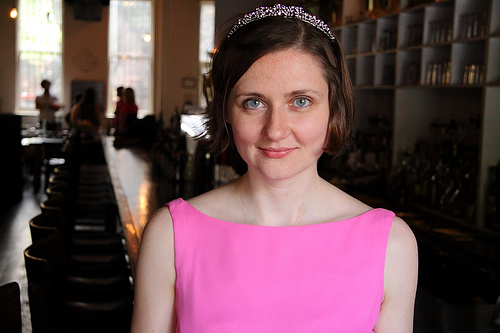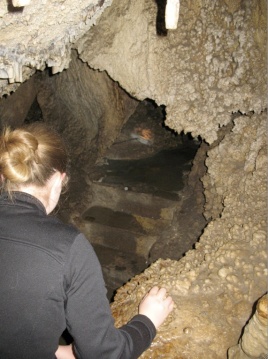
There’s a women’s university in Geneva that once possessed an unusual—and invaluable—archive. Hidden in a carefully-guarded room located somewhere in the university’s library was a collection of little-known texts. Books, ancient scrolls, letters, unpublished memoirs, and top-secret telegrams. Together they offered a version of history that’s much different than the one most of us are force-fed in school.
Those who were fortunate enough to peruse the archive knew that Alexander the Great was really Alexandra the Great. Shakespeare was the pen name of an actress named Molly McMartin. The first person to fly a plane wasn’t Orville or Wilber Wright. It was their half-sister Gertrude.
The archive in question proved, beyond all doubt, that our civilization was built by women. You were the person who brought all the texts together. And you were the person who died trying to protect them.
Your parents had both been librarians at illustrious European universities, and both had eventually quit in disgust. You and your sisters grew up in a tiny alpine village far from your parents’ hometowns. You were over-educated and horribly poor. And when you were twelve years old, your parents told you a story that would change your life forever.
Sometime between the World Wars, libraries all over the world were visited by men in unidentifiable uniforms. They came in and closed the doors behind them. For weeks, the libraries remained shut while “renovations” took place. When the doors opened once more, things inside had changed. Mostly first names and pronouns, as it turned out. Alexandra had become Alexander. Gertrude and Molly had disappeared altogether.
There were plenty of people like your parents who fought the revisions. By 1945, almost all were in hiding. It had taken two decades for history to be rewritten, but once it was, the whole world believed what it read.
There were still books out there, your parents told you, that hadn’t been revised. Books buried in library courtyards, books in waterproof boxes at the bottom of bogs, books tucked under mattresses the men in uniforms wouldn’t have wanted to touch.
You thought your parents might have gone mad until you found your first batch of unexpurgated books inside an outhouse on the slopes of the Matterhorn. From that day forward, you dedicated your life to hunting down the truth—what little was left of it.
You traveled the globe with nothing in your suitcase but two tweed suits and a dagger disguised as a fountain pen. When you located a text, you had it shipped to the university in Geneva, where kindred spirits filed it away in a safe and humidity-controlled environment.
You hoped to one day make your discoveries known to the public. And in 1965, you met a man who could make that happen. He was the dashing, debonair editor of an American newspaper. You whispered your secrets to him one night after a bottle of champagne and a kiss or two. When the men in uniforms arrived the next morning, you were too heartbroken to fight them.
But love hadn’t made you as reckless as many had hoped. They had captured the archivist, but the location of the banned books remained unknown. You’d told the editor they were in Genoa, not Geneva, and they ransacked most of Italy before they knew they’d been had.
Your fate wasn’t pleasant, and I won’t provide any details. The texts you collected were moved to a more secure location somewhere in Canada. Or Cambodia. Or Cameroon. I can’t say where, but I have a hunch that one day soon they’ll be read by the rest of the world.
You Were: The Hunter

You grew up in the frigid north. I’m not sure exactly where, and I can’t pinpoint when, but I do know that you reached the North Pole long before any man had a chance to plant his flag in the ice. But that’s not the point of this story. If you want to know more about the real discovery of the North Pole, you’ll have to contact The Archivist.
You were an Inuk, a stunning girl with silky black hair that never stayed tucked beneath your fur-lined hood and cheeks that turned a lovely red in the cold. You had more than your share of suitors, but you refused them all. A life spent cooking over the campfire simply wasn’t for you. Shortly after you were born, your father had asked a shaman to place a tiny ivory whale in your mouth, in the hope that his daughter would grow to be a fierce whale hunter. Your father got more—and less—than he bargained for.
At the age of six, you built your own qajaq and would set off alone in the tiny boat for days at a time. By the age of eight, you could drive a team of dogs faster than any of your brothers, build an igloo in an hour, and throw a spear past the horizon.
And yet, much to your father’s dismay, you refused to hunt the small, smiling white whales (the ones we know as belugas) that swam in nearby waters. You would go hungry for days rather than eat a bite of their flesh.
You never told anyone—it wouldn’t have made any difference—but you had a very good reason for refusing. Once, when you were still small, a fierce storm struck while you were out at sea in your tiny boat. The air was thick with snow, and you couldn’t even see your hands on the oar. There’s no doubt you would have perished, had three white whales not appeared beside your boat and guided it to land. When the blizzard finally blew away, the trio was still there, waiting to make sure that you had survived. They smiled at you before they disappeared beneath the waves.
Your father would have told you they had been sent by Sedna, the goddess who lived at the bottom of the sea. You knew that wasn’t the case. The whales had acted on their own. The creatures you’d been taught to believe were unthinking and unfeeling had chosen—yes chosen—to save a little girl.
At seventeen, you could no longer endure your parents’ constant badgering. And you knew you were of little use to them if you refused to hunt—or cook—the white whales. So you took the six dogs you had raised from pups and journeyed away from your family, across the white wasteland.
You had been traveling for days when you came across a large hole in the ice. Inside, six white whales had been trapped. The winter had come too quickly that year, and the ice had formed all around them. The open ocean was now too far away to make it to safety on a single breath. At the edge of a hole an enormous polar bear crouched, hoping to capture a meal. The whales thrashed in the water and avoided his claws. But they were growing tired, and a fatal mistake was only minutes away.
You defeated the polar bear and built an igloo next to the hole. For the next six months, you stayed with the whales, learning their strange language, and dining on polar bear meat. You came to love them, and when the spring thaw finally arrived, you were devastated to see your companions swim off to fill their empty bellies.
Weeks passed before you saw them again. You were rowing around an iceberg when the six friendly whales surrounded your boat, almost lifting it out of the water. They steered the craft to the north and pushed it for a full day and night. When you finally reached land, you were startled to see a campfire by the water’s edge. There sat a young man. He didn’t leap up with his spear in hand when he spotted the whales. He smiled and waved at them instead. The whales smiled back, and then they disappeared beneath the waves.
You Were: The Rainmaker

Eight hundred years ago, the cliffs and canyons of the Southwestern US were home to some of the most remarkable cities ever created by human hands. Their builders carved multi-story homes into rock. They constructed tall towers and dug sunken rooms for their ceremonies. So skilled were these ancient architects that their cities can still be visited today. The people who lived there disappeared long ago. We don’t know what the Puebloans called themselves. Centuries later, the Navajos gave them the name that stuck. Anasazi: The Ancient Ones.
You were born in the Cliff Palace in Mesa Verde, located in what is now Colorado. Your parents were ordinary folk. But they quickly realized that they had produced an extraordinary child. When you were less than two years old, you took a bad tumble and broke your arm. It never healed properly and you rarely used it. In fact, the only purpose it seemed to serve was to point upwards at the sky. The gesture, your parents soon discovered, was always followed by rain.
Throughout your childhood, you were known as the Rainmaker. You ate the best food, dressed in the finest raiment, and slept on the softest bed. It may sound like a pleasant existence. But you couldn’t have been more miserable. Someone was always watching you, twenty-four hours a day, waiting for you to point at the sky. You weren’t allowed to play with the other children who scampered along the cliff walls. When you grew older, you were forbidden to marry or start your own family. Nothing could threaten your health or well-being.
One day when you were nineteen years old, you felt the familiar ache in your arm. As the hours passed, it grew into a throbbing pain. A storm like no other was approaching the city. When you gave the sign, your people rejoiced. It had been months since the last rain had arrived.
When the first drops began to fall, everyone abandoned their homes to dance beneath the clouds. When your guardians joined the festivities, you quietly slipped out of the canyon and began your search for happiness and another home. (You found both, but that’s another story.)
You Were: The Swashbuckler
Perhaps you’re surprised to discover that you were a pirate. But you weren’t the plundering and pillaging type of pirate. You were the sort whose image graced the covers of popular pamphlets and the labels of liquor bottles—a handsome buccaneer with a shining silver blade at his side.
Most pirates were an unwashed bunch. They might have been fierce fighters, but the only thing legendary about them was the odor that trailed in their wakes. You were the pirate the world had been waiting for.
For the first few years of your career, you specialized in bloodless heists. Brilliant, bold, and unfailingly polite, you could capture a Spanish treasure ship and pick it clean without inflicting any injuries worse than a paper cut.
Your wealth and your legend grew every year. Sea shanties were composed in your honor, and even your victims loved to sing them. Your long velvet coats and knee-high boots were all the rage in London. Finally, at the age of twenty-five, you retired from the business. You purchased a mansion on the north coast of Jamaica and settled down to a quiet life of luxury. Your retirement lasted all of four months. That’s when the first pirate ship sailed into your harbor.
The captain of the ship hadn’t bathed in a year. You could smell him long before you met him at the door. You might have killed the man, if not for the humble expression half hidden beneath his scraggly beard. He wasn’t there to rob you. He was there for advice.
For the rest of your life, you greeted many such guests. You taught them the importance of personal hygiene. You schooled them in the sartorial arts. Even the dullest left your mansion a little bit wittier. You took smelly sailors and turned them into the swashbucklers people wanted to believe sailed the seas.
Your price was always the same. A barrel of rum. A fistful of doubloons. And the promise to use their wits more often than their swords.
You Were: La Pâtissière

In the 1780s, your father opened a pastry shop in Paris, one block from the Seine. He was said to make the best mille-feuille in all of France, and the store was an instant success. But it wasn’t until you joined him in the kitchen that the patisserie began creating the desserts that would make it legendary.
You could bake with the best of them, but it wasn't your cooking that brought you fame. The Revolution had begun. The aristocracy was no longer gorging on pastries, and no one wanted to be seen eating cake. Your father’s business was in serious trouble. Then one day, a handsome young man ducked into your shop. Your father was busy with the mille-feuille, so you stepped up to the counter to take the gentleman’s order.
He wanted to purchase a custom-made cake. He didn’t care about flavor or icing. He wanted to know if you could bake a secret message inside—a single word that would be revealed when the cake was cut in half.
You knew he was trouble. But you couldn’t resist. It’s possible that you believed in his cause. Though, at the time, you probably just thought he was cute. (You’d spent too much time baking to know much about politics.) Or perhaps you were looking for way to challenge your culinary skills. Whatever the reason, you joined the Revolution.
You taught yourself how to bake secret messages into cakes. How to hide keys in the gooey center of pastries. And how to plant a weapon inside a Buche de Noel. With your assistance, your handsome young friend grew famous. (And pastries became all the rage again.) You wisely decided to remain in the shadows.
The Terror started in 1793. Your boyfriend was too popular, and the men who now ran France had a guillotine with his name on it. Their soldiers watched his every move. He was hours away from arrest and days away from losing his head when you hatched the plan that would save his life. You baked a wedding cake just large enough for him to curl up inside.
Your boyfriend entered your shop and you emerged moments later. Two workers loaded a large cake into a carriage. You and the cake left under the soldiers’ noses, bound for a church outside the city. And safety.
When the people of Paris learned of your trickery, you became a celebrity overnight. Your father’s shop made a fortune. But you never knew of your fame. While your name was on every Parisian’s lips, you and your new husband were on a boat bound for America.
You Were: The Florist

(We have a very interesting victim today, but I shall maintain my policy of secrecy and allow her to divulge her own name if she chooses.)
You’ve always possessed excellent communication skills. That shouldn’t come as a shock. But you might be surprised to discover that you haven’t always relied on words to spin your stories or make your point. For five full decades of the nineteenth century, you used flowers instead.
These days, the language of flowers is all but dead. In fact only a few history buffs and a handful of Kiki Strike blog readers are even aware it existed. But throughout the Victorian era, it was the secret tongue of love-struck swains, randy aristocrats, and scorned women. And you spoke it better than anyone.
You owned a small shop in the Mayfair district of London. You employed no workers, posted no ads, and walk-ins were never welcome. The only way to purchase your wares was to request a personal appointment with the owner herself. In your business, discretion was of the utmost importance.
When your rich, aristocratic, or royal clients would arrive at your door, you would quickly whisk them inside. They were offered tea (or whisky) in your flower-filled workroom and invited to spill their hearts out. Sometimes you were forced to listen for hours. In all your days in the business, no one had ever requested a bouquet that simply said, “I love you” or “I’m sorry.” The emotions people needed to convey were always infinitely more complicated.
As your clients spoke, you pulled handfuls of blooms from the hundreds of buckets that lined the workroom walls and assembled them into stunning—and meaningful—arrangements. A bouquet of yellow roses and chrysanthemums was a brutal accusation of infidelity. A few lime blossoms tucked into vase of orange roses told the recipient that one’s intentions weren’t entirely pure. Striped carnations were a polite, “no thank you” that could let a suitor down easy. Morning glories were a humble acknowledgement that one’s love was in vain.
Your flowers said more than your clients ever could, and they always departed feeling relieved and unburdened. But over the years, your shop became so popular that you had little time left for a life of your own. Oddly enough, you barely noticed. You were content to tell other people’s stories.
Then one evening, only a few minutes after you’d arrived home at your modest apartment, there was a knock at the door. Outside stood a small lad holding an enormous bouquet of lavender roses. You must have gasped. Not because of the message they sent (love at first sight) but because you’d spent weeks desperately searching for roses. It seemed every greenhouse in Britain had been invaded by a rose-munching fungus. Even the flowers on the continent hadn’t been spared.
And yet they kept arriving at your apartment night after night. Light pink roses (passionate love). Red roses (true love). White roses (eternal love). Even blue roses (mysterious love). For the first time, you understood how it felt to receive one of your own arrangements. It was the most delicious torment you’d ever endured.
Finally, when you couldn’t stand the suspense anymore, you chose not to answer your door. Instead, you let the tiny delivery boy leave the bouquet on your doorstep. When he turned to go, you followed behind him. All the way to Hampstead.
He finally ducked into the servants’ entrance of a rambling mansion a stone’s throw from Hampstead Heath. You snuck around the side of the house and discovered an enormous greenhouse lit with gas lanterns. Inside, a rainbow of roses was in full, healthy bloom. And tending to the fragile blossoms was a familiar young man. He had come to your shop only a few weeks earlier to purchase a bouquet for his mother. (Heliotropes for devotion.) Considering the simplicity of his statement, he had stayed much longer than most. Still, you’d hated to see him go. He knew a great deal about flowers, and he had the most wonderful laugh you’d ever heard.
Too shy to say hello, you were just about to make your escape when he looked up and spotted you watching him through the glass.
You wore peach blossoms to your wedding.
You Were: The Headmistress

On an island in the middle of a bottomless loch in the coldest, dreariest county in Scotland, there sits a school for wayward girls. It's abandoned now, little more than a ruin. But in its day, it was the most dreaded institution in Northern Europe. You were its headmistress.
For many decades, you were a frequent visitor to the courtrooms of Edinburgh and Aberdeen. There you would sit in the very last row, awaiting the trials of Scotland’s most hardened young criminals. Poultry snatchers and counterfeiters. Swindlers and murderesses. You collected them all. As soon as a sentence of death was pronounced, you would rise and glide toward the bench.
This was hardly standard courtroom procedure, but no judge ever stopped you. The mere sight of you—raven hair pulled into a bun, a plain black dress with only buttons for ornament, and eyes as frigid and dark as Loch Ness—left most spectators speechless. Some said it was like watching the Grim Reaper come to claim a soul. You would whisper in the judge's ear and leave seconds later with the little lass in tow. No matter how heinous her crime, everyone in the courtroom pitied the girl. Death, they would have told you, was not always the cruelest of punishments.
After each trial, you and your trembling young charge would settle into the school’s luxurious black carriage for the long journey north. As soon as the horses were off, you would personally remove the girl’s shackles. Most would immediately attempt an escape. You carefully observed the level of finesse or brute force each girl displayed. You let her catch a whiff of freedom before you taught her your very first lesson.
After the child had been slammed back into her seat with a seemingly effortless flick of your wrist, you would tell her, “Someday you will be as strong as I am. Until then, you best mind your manners.”
Few people in the north of Scotland could have guessed what went on inside the massive stone school that had never been given a name. They knew it had been built by a wealthy member of the McLeod clan, but no one had ever encountered a graduate. Residents of the fishing villages surrounding the loch claimed that screams of terror often arrived on their shores along with the waves.
The screams were real, but they weren’t screams of terror. Frustration, maybe. Physical strain more likely. Training girls to be spies is a grueling, often noisy endeavor.
Your pupils were first schooled in self-defense. Then came cryptography, propaganda, and the black art of poisoning. All were taught multiple languages. They learned the seven fastest ways to kill a man, where to hide on a train as it crosses an enemy border, and three best places to conceal a dagger.
Graduates were often loaned out to the French government, but most stayed in Britain as secret agents in Scotland’s ongoing (yes, ongoing) war against England. One of your girls was even responsible for the untimely death of Prince Albert in 1861. Many hoped that his demise would weaken the queen. Unfortunately, the tiny monarch proved to be as tough as any of your graduates.
Despite your best efforts, Scotland didn’t win its independence during your lifetime. But the girls you had saved from the noose considered your life an unparalleled success. You had been strict, sometimes harsh, but you were still a saint in their eyes. When you died at the age of seventy-nine, boats filled with hundreds of women were spotted rowing across to your island. All of the travelers hid their faces behind lacy black veils. They stayed a single night and vanished the next morning, taking all the school's students with them. The lights of your academy have remained off since that day.
You Were: Buxom Kate

You were one of the best known hoisters (shoplifters) in Victorian London. Your specialty was ladies' silk stockings. (Which may explain why you often feel drawn to the hosiery aisles of department stores.) It took a split second for you to roll up a pair of stockings and stuff them down the front of your dress. (Hence your underworld nickname, Buxom Kate.) Shopkeepers who confronted you were met with one of your well-honed defenses. The first was a smile that could melt most misers' hearts. The second was a swift, infallibly aimed kick in the pants.
You maintained an impressive roster of clients who were always happy to purchase your illicit wares, and they appreciated your discretion as much as your fashion sense. They paid quite well, and your profits allowed you to support your eight nieces and nephews, whose parents had met an untimely and tragic end. (I can't see exactly how, but it had something to do with homemade turtle soup.) You never allowed your charges to know how you managed to keep them in clean knickers or meat pies. In fact, most of them believed you were the Queen's personal librarian. (One thought you might work in a candy store.)
Those weren't easy years, and you weren't at all proud. But your life of crime came to an abrupt end when you found yourself confronted by a burly female shopkeeper who could neither be charmed nor kicked. You were sent to Newgate Prison, and would have been sentenced to death had the judge not fallen victim to your notorious smile. Rather than sending you to the gallows, he sent you to Australia instead. (Which, had he known about your fear of giant reptiles, might have been the crueller punishment.)
Your former clients, grateful that you had refrained from spilling the beans, conspired to have your nieces and nephews follow you to New South Wales with a nice chunk of change rattling in their pockets. The nine of you were reunited in Sydney, and together you started the most successful sheep station in the country.
By your second year in Australia, you could shear an ewe in two minutes flat and knit stockings from the wool before the sun set. As you might imagine, you were very popular with the neighboring ranchers. But you refused to marry any of them, choosing instead to play the field. (Which made you very unpopular with the few other ladies around. Good thing you were such a crack shot. )
Sadly, your fear of giant reptiles proved prophetic. At the age of 60, you were consumed by a crocodile brought down from Queensland by a neighbor who fancied having his own zoo. By the time you were discovered, all that was left were your feet.
You were identified by your stockings.
You Were: The Girl Who Saw Everything

In certain small Hungarian towns not far from the Romanian border, you are still known as the Girl Who Saw Everything. You grew up in one of those hamlets, the daughter of pig farmers and the sixth of twelve children. From the moment you learned how to walk, you would patrol your village, keeping an eye on the neighbors. Some considered you a nuisance. (Particularly those who caught you peeping in their windows.) Others came to rely on you to investigate and solve petty crimes. (Mostly goat or pig thefts. Your siblings were usually the culprits.)
Over time, you earned so much respect that you were the only young woman allowed out of her house after sunset. One evening in 1241 (or 1242, I can't be sure), you were hunting down a purloined goat when you detected the sweet fragrance of roasted meat wafting from a cave on the outskirts of town. Hoping to catch the thief greasy-handed, you tiptoed to the opening of the cave and spied three men feasting (to put it politely) on the poor creature. Their distinctive smell and atrocious table manners told you they couldn't have been raised in your town. (Your village was one of the few in 13th century Eastern Europe that insisted on the proper use of forks and knives.) Their horses and gear identified the men as scouts for the dreaded Mongol army. Their presence meant that more enemy troops would arrive within days, and your entire village would be annihilated.
You've been a quick thinker in all of your lives, and this time you knew exactly what to do--nothing. The cave the men had chosen was home to a pack of bloodthirsty wolves who would be drawn back home by the smell of meat. Although they liked goat, they preferred their dinners raw. Let's just say the wolves ate very well that night.
The next morning, the people of your town evacuated to a nearby fortress, and you rode throughout the region warning other villages of the horrors to come. (You've always been an excellent horsewoman, am I right?) Some chose not to listen to a young girl and met with terrible fates. Most managed to move their people to safety. As a token of their gratitude, the people of western Hungary gave you two hundred goats and the hand of the best looking young man around. (It's a good thing you liked him, or that could have been awkward.)
Forty years later, when you died of an infected fingernail, you were rich, happy, and surrounded by your beloved goats (and children).
You Were: Betsy Ross

Yes, the Betsy Ross. Quelle coincidence, n'est ce pas? (For those of you from other lands, legend has always had it that Betsy sewed the first American flag for George Washington. She didn't. But she was a cool chick.)
I could use this opportunity to tell you what Betsy really did during America's Revolutionary War. (Never trust a history book.) But I'll leave that revelation to enterprising historians. What's most important now is that there's someone you need to find. You knew him as Betsy, you knew him before Betsy, and you may know him in this life. If not, I suggest you start looking.
In 1752, you/Betsy were born into a Philadelphia Quaker family. As you were growing up, your father enforced the strictest discipline and insisted his seventeen children dress only in the drabbest clothing. You would have said it was like being in the army, if your whole family hadn’t been conscientious objectors.
Hard work was a cornerstone of your father’s beliefs, and the very day you finished school you were sent to work for an upholsterer. That’s where you would meet the love of you life/lives, John Ross.
From the first moment you set foot in the shop, the tall boy with dark blond hair couldn’t seem to stop watching you. And though you’d always been taught the importance of modesty, you soon found yourself trading glances with him. Maybe he seemed oddly familiar. Maybe you liked his wide, warm smile. Or maybe he was just smoking hot. (He was.) Whatever the reason, when the work day was over you allowed John to walk you home. (Not all the way, of course. That was too much for a first date.)
You had never held a conversation with a man who wasn’t a relative. But you immediately felt comfortable in John Ross’s company. He was funny, even outrageous at times. (His impersonation of your boss was particularly scandalous.) You laughed more on that first walk home than you’d been allowed to laugh throughout your entire childhood.
When, toward the end of your stroll, John told you that he'd lived other lives, you decided to share the secret you’d been hiding from your family for fifteen years. He was the only person you ever told.
Six months after your first meeting with John Ross, the two of you eloped and were married at a New Jersey tavern. Your cold-hearted father never spoke to you again, and you were kicked out of the Quaker church. But you didn't care. Finally, you’d found the family you wanted.
Sadly, your bliss didn’t last long. Just two years after you were married, John Ross was killed while fighting the British. It’s a true testament to your character that you chose to go on. Throughout the war you did your best to keep American troops supplied with uniforms, blankets, and tents. You even married twice more, but it was never the same.
Whenever you felt down, you would walk the same route you walked that first day with John. Even when you were very old, you could be seen hobbling down the path that led from the upholstery shop to your father’s home. You’d think of the secret you had shared with John and know in your heart that you’d meet him again at some point in the future.